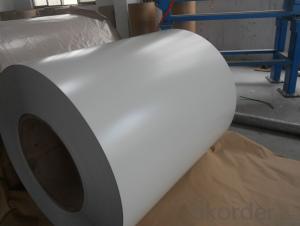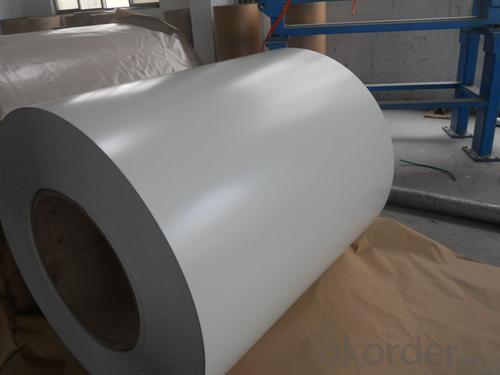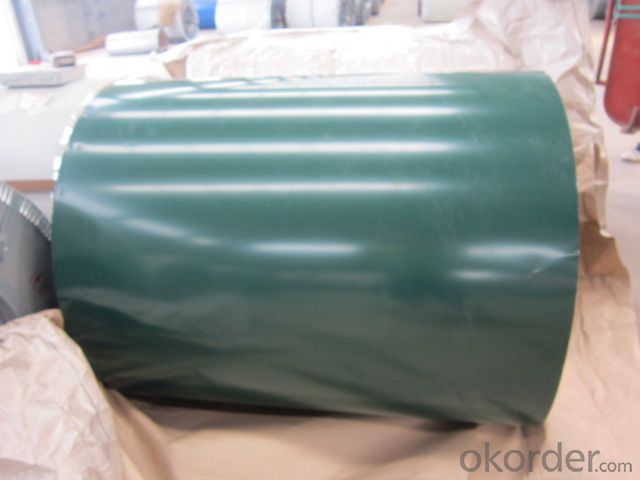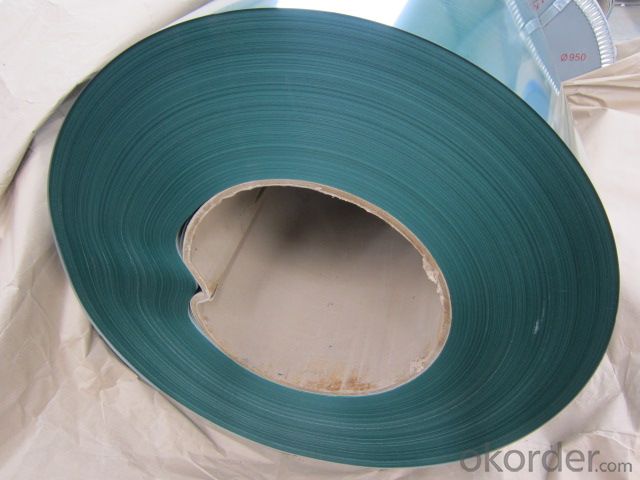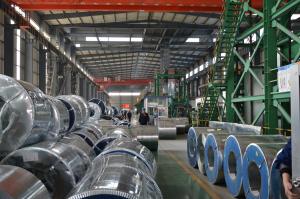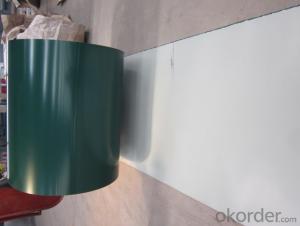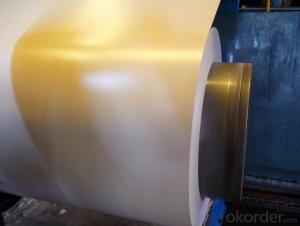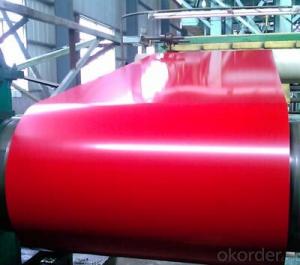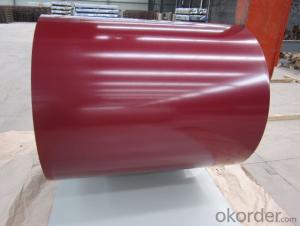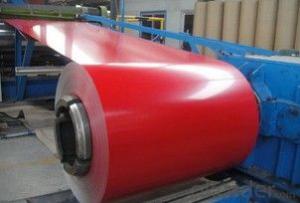Colored Pre Painted Galvanised Steel Coil
- Loading Port:
- Shanghai
- Payment Terms:
- TT OR LC
- Min Order Qty:
- 25 m.t.
- Supply Capability:
- 10000 m.t./month
OKorder Service Pledge
OKorder Financial Service
You Might Also Like
Description:
Pre-Painted Steel Coil is coated with organic layer, which provides higher anti-corrosion property and a longer lifespan than that of galvanized steel sheets.
The Pre Painted Steel Coil can also be classified into groups by their surface textures, namely regular prepainted sheets, embossed sheets and printed sheets.
The production process has evolved from one-coating-and-one-baking to double-coating-and-double-baking, and even three-coating-and-three-baking.
The base metals for Pre Painted Steel Coil consist of cold rolled, HDG electro-galvanized and hot-dip alu-zinc coated steel. The finish coats of Pre Painted Steel Coil can be classified into groups as follows: polyester, silicon modified polyesters, polyvinylidene fluoride, high-durability polyester, etc.
Application:
It’s suitable for indoor or outdoor decoration, color lasting for at least 10 years for outdoor using, could for roll forming., conditioning, micro-wave oven, bread maker,solar water heater,condencing apparatus,Blackboard, white board,chalkboard, hidden cell blackboard,bulletin board,Central heating slice, lampshade, chifforobe, desk, bed, locker, bookshelf,garbage can, billboard, typewriter, instrument panel, weight sensor, photographic equipment,coffin, fence, Prepainted Galvanized Steel Coil
Electrical appliance:Refrigerator, washer, switch cabinet, instrument cabinet, air
Product Specification:
Color pre painted steel in coil
Thickness: 0.3-0.8mm
Width: 914-1250mm
Inner Diameter: 508mm,610MM
Weight of Steel Coil: 3-8MT
Available Dipped Layer: 50-150g/m2
Coating Type: Al-Zn Alloy
Paint: PE or PVDF
Available Surface Treatment: Passivating & Oiling & AFP & Filming
Type of coating structure: 2/1 Coat the top surface of the steel sheet twice, coat the bottom surface once, and bake the sheet twice.
Front Side Paint Thickness: 15-25μm
Back Side Paint Thickness: 5-10μm
FAQ:
1.Could you tell me the package for the Pre Painted Steel Coil?
Usually Standard export seaworthy package: waterproof paper+steel trip packed+wooden case seaworthy package
2.How about the color of the Pre Painted Steel Coil
The color of the Pre Painted Steel Coil has a very wide selection, like orange, cream-colored, dark sky blue, sea blue, bright red, brick red, ivory white, porcelain blue.
3. Can you produce the goods according to our requirements?
Yes, of course, it can be customized according to customer’s requirements.
Protective film can be provided according to customer if you needs.
- Q: 7850kg/cu.m density is typical for all type of steel? like reibar, I- beam and so on
- 90% of the steels used today are plain mild carbon steels consisting of iron with less than 1% carbon content and as such have a density of about 7750 kg/cubic meter. Some special steels which have a significant percentage of alloying elements such as chrome or manganese or other elements will have greater density bringing the steel up to about 8000 kg / cubic meter. There are a greater many factors influencing the exact density of a steel. Even for steels of exactly the same content of iron , carbon and other alloying elements, there may be a difference ( very small mind you ) in density due to work hardening. The difference in this case is due to movement of dislocations which become locked in the grain boundaries and this forms a more dense crystal structure. For this same reason, the theoretical density of steel (which does not take into account dislocations) is greater than the measured density of steel.
- Q: How are steel coils inspected for coil set?
- Various methods and equipment are utilized to inspect steel coils for coil set. Coil set refers to the curvature or shape of the coil, which can affect its performance and usability in different applications. One way to inspect steel coils for coil set is through visual examination. Experienced operators or inspectors carefully assess the coils for any visible deformities or irregularities in their shape. This can be accomplished by unrolling a section of the coil and checking for signs of buckling, twisting, or unevenness. Visual inspection is a simple and cost-effective method to identify evident coil set issues. In addition to visual examination, more advanced techniques are employed to accurately measure and quantify coil set. One such technique involves using a straight edge or template. The straight edge is placed along the length or width of the unrolled portion of the coil, and any gaps or deviations from the straight edge indicate the presence of coil set. This method provides a more precise measurement of the extent and severity of the coil set. Another commonly used technique is the utilization of specialized tools like a non-contact laser measurement system. This system projects a line onto the surface of the coil using lasers and measures the distance between the line and the coil. Any variations in this distance indicate the presence of coil set. This method offers high accuracy and provides detailed data on the coil's shape and curvature. Other methods may involve the use of mechanical devices such as rollers or tensioners to unroll and measure the coil's shape. These devices exert controlled pressure on the coil to straighten it out, and any resistance or deviations encountered during the process serve as indications of coil set. Overall, the inspection of steel coils for coil set involves a combination of visual examination and precise measurement techniques. These methods aid in identifying and quantifying any deformities or irregularities in the coil's shape, enabling manufacturers and customers to make informed decisions about the usability and quality of the steel coils.
- Q: How are steel coils processed for pickling or oiling?
- Steel coils are processed for pickling or oiling through a series of steps. First, the coils are unwound and cleaned to remove any dirt or debris. Then, they are passed through an acid bath to remove any oxides or rust from the surface of the steel. After pickling, the coils are rinsed with water to neutralize the acid. Finally, the coils may undergo an oiling process where a thin layer of oil is applied to protect the steel from corrosion.
- Q: Alright, First off i have an old plywood military box with galvanised steel corners, hinges etc (any part that must be strong) and its rusting! Some of the pieces have discoloration (like an oil stain on them) and other parts are full of this metallic dust. 1) Should i remove this box from my room?2) Is there any way or should i remove the powder on the part?3) Does this pose a serious health hazard?4) What are the oil stains?
- Dear HC, You have a great military box and a cool conversation piece. Take a vacuum and clean the dust. Take some 0000 steel wool and use on the steel parts. This will take some elbow grease! If this doesn't work try some 320 grit sand paper. lightly sand the wood and brush polyurethane on everything . The box doesn't pose any health problems. Also you might find that the box will bring a pretty good price if you decide to sell. Good luck. Sniper
- Q: Please people suggest me how can I select external finishing for Steel Building as there is a wide range of choice available.
- Hi okorder /
- Q: How are steel coils used in the manufacturing of furniture?
- Steel coils are commonly used in the manufacturing of furniture as they provide structural support and stability. They are typically used in the construction of sofa frames, mattress foundations, and other furniture pieces that require strength and durability. The coils are often incorporated into the furniture's framework or used as a base for cushions and upholstery, ensuring long-lasting and comfortable products.
- Q: I saw this really pretty ring online and it was made of steel. Is this a good ring? If I were to wash my hands with it on, would it rust and turn my finger green?
- Steel rust is brown not green! Very much expected to be of one type of stainless steel, and you should have no problem.
- Q: How do steel coils contribute to the manufacturing of electrical equipment?
- Steel coils play a crucial role in the manufacturing of electrical equipment due to their unique properties and versatility. Firstly, steel coils are used in the production of transformer cores, which are essential components in electrical equipment. The magnetic properties of steel make it an ideal material for transformer cores as it allows for efficient energy transfer and reduces energy losses. The coil shape of the steel enables it to generate a magnetic field that facilitates the transformation of voltage levels, thus ensuring the proper functioning of electrical equipment. Moreover, steel coils are commonly used in the production of motors and generators. These devices rely on magnetic fields to convert electrical energy into mechanical energy and vice versa. The coil shape of the steel allows for the creation of electromagnetic fields, which are necessary for the operation of motors and generators. Additionally, the strength and durability of steel ensure that the coils can withstand the high temperatures and mechanical stresses that are often encountered in electrical equipment. Furthermore, steel coils are utilized in the construction of electrical conductors, such as wires and cables. These conductors enable the transmission of electricity from power sources to various electrical devices. Steel, with its high electrical conductivity, ensures efficient power transmission while also providing mechanical strength and protection from external factors such as corrosion and wear. The coil shape of steel wires further enhances their flexibility, making them suitable for various applications in electrical equipment manufacturing. Overall, steel coils contribute significantly to the manufacturing of electrical equipment by providing the necessary magnetic properties for transformer cores, enabling the generation of electromagnetic fields in motors and generators, and facilitating efficient power transmission in electrical conductors. Their versatility, strength, and durability make steel coils an indispensable component in the production of reliable and high-performance electrical equipment.
- Q: I wrote in my assignment that mild steel has a high carbon content (4%).This is why it has its strong and rigid properties.. is this correct?
- Bazza is heading in the right route yet time fogs the remember for us all. cut back small try samples off the inventory bar say pound coin thickness. warmth cherry purple and quick quench in water. The intense carbon metallic will be hardened so puzzling to scratch even as gentle scratches genuinely utilising a drill element or hacksaw blade. That warmth treatment will go away the metallic in its toughest maximum brittle state so will carry an edge yet snap like a carrot. So having hardened your merchandise it can be tempered to get rid of a few hardness and presented toughness. So the compromise is difficult adequate to carry the edge yet difficult adequate to deflect sensibly without fracture. Swot up on mood colors/warmth treatment and practice on scrap. an exciting litte exercising i have used with apprentices contained in the previous is to take an old document and anneal (melt) it so it drills or takes a said cut back genuinely then re harden it so it files back. The tang will be got here upon harder than the blade though it is the same metallic. note the tang will be bent without snapping. For practice you are able to harden the tang so it snaps common. in simple terms by how scrap chilly chisels, drill bits, files etc are in simple terms the metallic you want and recycleable by forging and warm temperature teatment. i think a Samurai second drawing close!!!!! sturdy success
- Q: How are steel coils used in the manufacturing of railway bridges?
- Steel coils are used in the manufacturing of railway bridges as they are formed and shaped into structural elements such as beams, girders, and plates. These steel components provide the necessary strength, durability, and load-bearing capacity to support the weight of trains and ensure the structural integrity of the bridge.
Send your message to us
Colored Pre Painted Galvanised Steel Coil
- Loading Port:
- Shanghai
- Payment Terms:
- TT OR LC
- Min Order Qty:
- 25 m.t.
- Supply Capability:
- 10000 m.t./month
OKorder Service Pledge
OKorder Financial Service
Similar products
Hot products
Hot Searches
Related keywords
